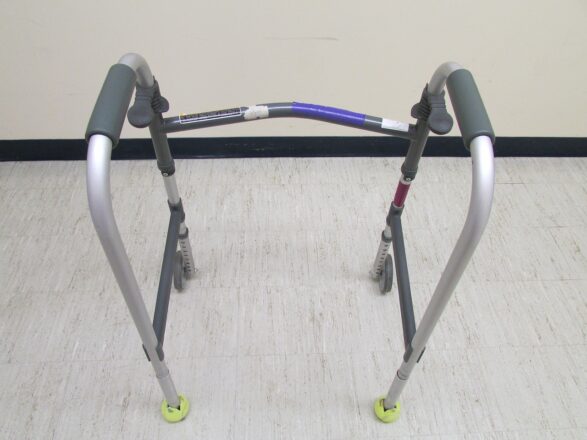In the realm of personalized care, Home Health Aides (HHAs) are increasingly becoming indispensable. They gracefully serve a vital role in assisting individuals – often older adults – with their activities of daily living (ADLs), which enables them to maintain their independence at home. From providing assistance with personal care – including bathing, dressing, and maneuvering- to light housekeeping duties and meal preparation, HHAs are always at the helm, ready to lend a hand.
They are the supportive friend nudging reminders about medication, the vigilant companion picking up prescriptions, and the caring family member providing crucial social connection. As these healthcare heroes navigate through their shifts – as short as two hours or as long as eight hours – the Bureau of Labor Statistics predicts a significant 41% increase in the demand for their valuable role by 2026. So let’s discover the depth of their responsibilities in the burgeoning field of home health care.
Understanding the Role of Home Health Aides
The role of Home Health Aides (HHAs) is significantly vital in our society. They play an indispensable role in helping patients and the elderly maintain a certain level of independence whilst also receiving the necessary care and companionship they require. Their role spans across different aspects of care, making them a pivotal part of home health services.
Defining Home Health Aides
Home Health Aides are professional caregivers who provide various services to individuals who have difficulties completing daily tasks due to their health conditions. Their clientele mainly comprises the elderly, those recovering from surgeries, or individuals facing chronic illnesses or disabilities. Their responsibilities cover a wide range, including assistance with personal care, light housekeeping, preparing meals, providing companionship, and much more.
Why Home Health Aides are Needed
HHAs are necessary for various reasons. Most importantly, they provide individuals with a chance to remain independent at home, keeping them comfortable in familiar surroundings as they age or recuperate from an illness. Furthermore, HHAs offer family members respite, knowing that their loved ones have access to professional and compassionate care. This helps reduce the stress and pressure often associated with caregiving.
Scope of HHAs role in Home Care
The role of HHAs in home care is extensive. From personal care services to simple domestic chores, a HHA can provide several services based on the needs of the client. Notably, they play a significant role in assisting with Activities of Daily Living (ADLs) like bathing and dressing. They may also provide mobility support, meal preparation aid, medication management, and companionship.
HHAs and Activities of Daily Living (ADL)
HHAs are instrumental in helping individuals with basic yet essential everyday tasks – the Activities of Daily Living.
The Importance of ADL to Independently Living
Activities of Daily Living (ADLs) include tasks that are fundamental for a person’s self-care and independence, such as feeding, bathing, dressing, and mobility. Being capable of performing these activities independently is crucial for any individual’s dignity and self-esteem. That’s why, when health conditions prevent them from doing so, assistance with ADLs becomes an essential service that HHAs provide.
Tasks included under ADL
Tasks under ADL include basic self-care activities such as bathing, getting dressed, toileting, eating, and transferring from bed to chair and vice versa. They also include instrumental activities like cooking, cleaning, managing medications, and shopping for groceries—all these tasks are geared towards fulfilling the person’s basic physical needs and maintaining their independence.
HHAs Assistance with ADLs
assisting with ADLs constitutes a major part of a HHA’s responsibilities. They ensure that clients can perform these activities in a safe and hygienic manner. They assist with dressing, bathing, meal preparation and eating, moving from one place to another, among other tasks. The goal of HHAs is to provide the right balance of assistance – allowing the client to retain as much independence as possible while ensuring their safety and well-being.

Personal Care Assistance by HHAs
One key duty of HHAs is providing personal care to clients.
Tasks involved in Personal Care
Personal care involves a range of tasks – from grooming to bathing, toileting, and dressing. They also may have to help with tasks like brushing teeth or hair, shaving, and keeping the client’s personal space neat and tidy.
Importance of Personal Care for People with Disabilities
Personal care can be especially important for people with disabilities or seniors. This level of care ensures that they maintain good hygiene, which is crucial for their overall health. Personal care assistance provided by HHAs also helps to safeguard the dignity and self-esteem of the individual they’re caring for.
How HHAs help with Personal Care
HHAs assist with personal care by engaging in activities like bathing clients, helping with dressing, and toileting tasks. They might also assist with grooming tasks, such as hair brushing or shaving. Crucially, they do these tasks with a high level of patience, kindness, and respect, preserving the dignity and comfort of the person they are caring for.
Mobility Support by Home Health Aides
Mobility support is another essential service that HHAs provide.
Importance of Mobility Support
Mobility is vital for any individual’s independence. Also, regular movement helps with circulation, muscle tone, and overall well-being. However, for those with physical challenges or health conditions, movement can be difficult and unsafe without assistance.
How HHAs can assist clients with Mobility
HHAs can provide vital support to clients in moving around safely. Whether it’s assisting them out of bed, helping them walk around their home, or transferring them to their wheelchair, HHAs ensure they can move around their homes safely and comfortably.
Challenges faced in Mobility Support and how HHAs overcome them
Mobility support does come with challenges, such as managing potential falls or ensuring the client isn’t overstressing themselves. However, HHAs overcome these challenges through rigorous training that equips them with the correct techniques to assist with mobility. They also keep track of the client’s abilities and adapt their methods as needed, constantly prioritizing the client’s safety and comfort.

Meal Preparation Responsibilities
HHAs often take on the responsibility of helping their clients with meal preparations.
Why Meal Preparation is Important
Meal preparation is vital because a balanced and nutritious diet directly influences a person’s health. For some clients, health conditions or mobility issues may prevent them from preparing their meals.
HHAs Role in Meal Preparation
When an HHA takes on meal preparation, they ensure that the meals are nutritious, balanced, and align with any dietary needs or restrictions the client might have. They might also aid with grocery shopping to ensure the client has everything necessary for their meals.
How HHAs adapt to individual clients’ dietary needs
HHAs ensure that the meal preparation suits the individual client’s dietary requirements. Whether it’s catering for diabetes, heart disease, food allergies, or specific cuisine preferences, HHAs work to prepare meals that keep their clients healthy and satisfied.
Medication Management and Home Health Aides
Another important responsibility of HHAs revolves around medication management.
Importance of Medication Management
Appropriate medication management can significantly impact the client’s health and recovery, making it a crucial aspect of care.
How HHAs assist with medication reminders and prescription pickups
HHAs can help by giving medication reminders, picking up prescriptions from the pharmacy, and ensuring the client takes their medications as prescribed. Their support in this aspect can prevent medication errors and complications.
Challenges in Medication Management and how HHAs tackle them
Medication management may be challenging, especially if the client is on multiple medications or has a complicated medication schedule. However, HHAs employ techniques like medication charts or pill organizers to ensure the client’s medication regimen is followed correctly and efficiently.
Companionship Role of Home Health Aides
Companionship is a non-tangible yet critical service that HHAs offer.
Role of Social Connections in Health
Maintaining social connections and interaction is vital for mental health and overall wellbeing, particularly for the elderly. Howard noted that feelings of isolation and loneliness could potentially lead to depression and other health issues.
How HHAs provide Companionship
HHAs offer companionship by engaging in conversations, sharing meals, participating in hobbies and games, or accompanying the client to social events. They provide a friendly presence that helps the client feel connected, valued, and less isolated.
Balancing Professional Boundaries and Friendly Companionship
While HHAs provide companionship, they also maintain professional boundaries to ensure that their relationship remains constructive and centered around the health and well-being of the client.
Flexibility of Working Hours for Home Health Aides
HHAs typically have flexible working hours, depending on the needs of their clients.
Differences in client needs and how this impacts HHA working hours
Since each client’s needs are unique, so are the working hours of an HHA. Some clients might require assistance for a few hours each day, while others might need round-the-clock care.
Short shifts versus long shifts – benefits and challenges
Short shifts often allow HHAs to work with multiple clients, providing services to more individuals. However, long shifts ensure continuity of care for the client, which is especially beneficial for clients with more severe health conditions. Both types of shifts have their unique challenges, from managing multiple clients’ schedules to dealing with the demands of providing continuous care.
The effect of varying work hours on the work-life balance of HHAs
The nature of variable working hours can sometimes place a strain on the work-life balance of HHAs. However, many HHAs appreciate the flexibility their role offers and manage to make the necessary adjustments to maintain a healthy work-life balance.
Increasing Demand for Home Health Aides
In recent years, there’s been a surge in the need for HHAs.
Factors contributing to increased demand
Factors such as an ageing population, increased life expectancy, a rise in chronic illnesses, and a preference for ageing in place are driving this increased demand for home health aide services.
Predictions for future demand
With trends of ageing societies, the need for HHAs is only expected to grow. The Bureau of Labor Statistics predicts a 41% increase in home health aide jobs by 2026—indicating a robust demand.
Impact of the growing demand on the home health industry
This growing demand implies that the home health industry has to work towards training and preparing a larger force of highly-qualified HHAs to meet this need.
Challenges and Prospects for Home Health Aides
Despite their critical role, HHAs often face certain challenges.
Challenges HHAs currently face
HHAs face numerous challenges ranging from physical strain, emotional stress, low pay, lack of adequate resources and recognition, to meeting the varying needs of their clients.
Potential solutions or improvements to the current challenges
Addressing these challenges requires multiple strategies, including better job benefits, more comprehensive training, improved resources and supportive work environments.
Career prospects and opportunities for HHAs given the increasing demand
However, the silver lining is that the increasing demand for HHAs presents numerous career opportunities. There are opportunities for steady employment, career advancement through further training and specialization. There is also the unique opportunity to make a significant difference in the lives of many individuals.
In conclusion, the role of a Home Health Aide is multifaceted, involving physical care, psychological support, and social companionship. Despite various challenges faced, the increasing need for HHAs highlights the relevance and importance they hold in today’s society.
